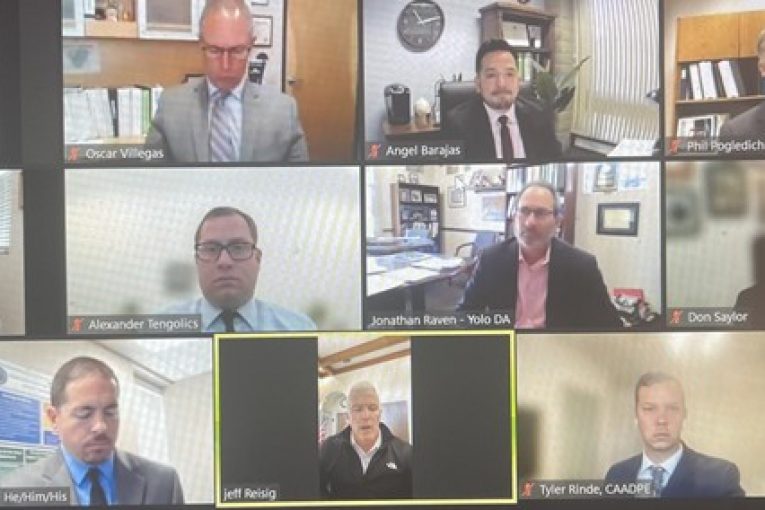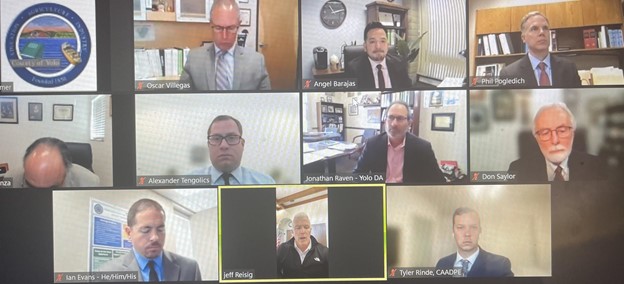

by Robert J. Hansen
Woodland, CA – The Yolo County Board of Supervisors, Jeff Reisig and Jonathan Raven of the District Attorney’s Office, and Ian Evans with the Health and Human Services were at the Yolo County BOS meeting on Tuesday, April 12, 2022.
The Yolo County Board of Supervisors voted 4-1 in favor of a bill that would allow for a pilot drug diversion program in Yolo and four other counties at yesterday’s meeting.
If passed by state legislators, Hope California or AB 1928 would establish a secured drug treatment facility where felony offenders could be sentenced and treated for substance use disorders rather than serving a jail or prison sentence according to the bill.
Yolo County District Attorney Jeff Reisig said AB 1928 is not much different than AB 1542 which Governor Gavin Newsom vetoed last October for concerns of coerced  treatment.
treatment.
“Other than the 50 amendments that he’s taken, not much has changed,” Reisig said.
The DA’s office, sponsor of AB 1928, and the Yolo County court system have used many programs to try to get people help, yet many continue to face prison time, according to Reisig.
“What AB 1928 proposes to do is create a new path for these people that is all about treatment,” Reisig. “Instead of being warehoused in prison, they are being offered an option to choose treatment in a secure facility.”
Ian Evans with the Yolo Health and Human Services Agency said Yolo needs more effective tools for all who suffer from homelessness, not just those with substance abuse or mental illness.
There is a lack of resources for those who need the support according to Evans.
“At any given time we have between 20 to 30 residential beds available,” Evans said. “We frankly need probably close to double that.”
Supervisor Don Saylor was the only supervisor who was concerned with and did not support the bill.
“I’m compelled by the universe of people who work in treatment coming forward with opposition. Their arguments I think are very strong,” Saylor said.
Saylor thinks something better can be done, as this is driven by an impulse to take people off the streets.
“Last year the bill was very scant on treatment programs, it was truly a custody facility proposal. This year that’s being addressed. But I can just imagine these court hearings,” Saylor said.
Saylor said juries and judges would be persuaded to convict to receive a prison sentence, which then allows for the offer of the treatment program.
“All we’re asking is that you convict this person so that they can have access to this program. They can choose the program but we need the conviction first,” Saylor said. “That’s a very difficult hurdle for a judge and jury. It creates an imbalance in the system that I think is unwise.”
Chief Deputy District Attorney Jonathan Raven said the program would focus on individuals found unsuitable to be treated safely in the community based on their substance abuse and the level of their crimes.
“This program would be focused on that population, those who cannot be treated safely in the community and who would be sentenced to state prison or lengthy jail sentences,” Raven said. “The jail does not have good services, I hope they get better but they don’t right now and when people go to prison, our county loses complete control over our people.
The program would be for individuals that would not be covered in another existing program and would avoid the horrible services for substance abuse disorders and mental illness in our prisons according to Raven.
“When they go to prison, they don’t come out better, that’s for sure,” Raven said.
Yolo Public Defender Tracie Olson voiced her opposition to AB 1928 at the meeting.
She said that AB 1928 is very similar to the California Rehabilitation Center (CRC), a prison in Northern California which had a program called the Civil Addict Program (CAP).
“It’s very similar to what AB 1928 is,” Olson said.
People facing a prison sentence could choose CAP, which was an in-custody program that would allow a shorter sentence is completed.
“I did not have experts explain to me why this didn’t work but what I did see was clients cycle in and out over this program over and over,” Olson said. “Simply because they were not ready.”
Olson would like to see voluntary treatment and support rather than go down this road again.
This incentivizes prison sentences because the DA decides what offenses to charge, which to dismiss and whether prison should be offered according to Olson.
“What is perceived to be a great treatment program is only offered with a prison sentence, that’s what we’ll get,” Olson said
The other four supervisors supported the bill, sharing the opinion that it is a pilot program and does not have to be permanent and therefore worth attempting.
Supervisor Angel Barajas said he spoke with people in his district and a choice for people to go to treatment instead of jail or prison was popular.
“That’s what a lot of these elected officials in the state legislature are hearing and I’m hearing too,” Barajas said. “It’s an alternative, it’s a solution, it’s a pilot program. We have to take the right step forward to see if it works.”
After public comment, a majority of which opposed the bill, Yolo Supervisors voted 4 to 1 supporting AB 1928.


Title of article:
Why not:
or:
I wanted both Saylor and Reisig in the headline. And the first was a bit more edgy than the second.
I think it more comes down to your bias.
Or perhaps it reflects reality. Staff said the program was unnecessary and the experts believe it is the wrong approach and yet four of the five board members supported it anyway.
Who’s experts? Why not the other experts?
What data? Why not the other data?
What bias? Why not the other bias?
Which Alan? Why not the other Alan? . . . or that other other Alan?